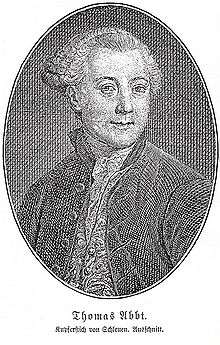Thomas Abbt

Thomas Abbt (German: [apt]; 25 November 1738 – 3 November 1766) was a German mathematician and writer.
Biography
Born in Ulm as the son of a wig-maker,[1] Abbt visited a secondary school in Ulm, then moved in 1756 to study theology, philosophy and mathematics at the University of Halle, receiving a Magister degree in 1758. In 1760 he was appointed as an associate professor of philosophy at the University of Frankfurt (Oder), where he wrote his most well-known work Vom Tode für's Vaterland (1761).[1]
This highly patriotic tract thematises Frederick II's defeat at Kunersdorf. It also drew the attention of the editors of the famous Literaturbriefe (Literary Letters), started by Gotthold Ephraim Lessing. He contributed a large number of historical, political, esthetical and philosophical essays. Abbt was a fervent admirer of Lessing and seconded his educational, prosaic style of writing.
In autumn 1761 he was appointed as full professor of mathematics in Rinteln.[1] In 1763, he entered a competition that was sponsored by the Berlin Academy for an essay on the application of mathematical proofs to metaphysics. Among the competitors were Moses Mendelssohn, who won, and Immanuel Kant. While in Rinteln, Abbt wrote his other famous work, Vom Verdienste (1765).[1]
He travelled for nine months to France, where he was able to speak with Voltaire in Ferney. He also climbed in the Alps of Savoy. This travel and the disapproval of the life at the university raised his urge to trade the Theory for the Life.
While dealing with the idea to become a historian, he was offered in 1765 at the same time a professorship at the University of Marburg and a post as Councillor of the Court at the court of Count Wilhelm von Schaumburg-Lippe. He decided for the latter. The count was highly interested in the plans of Thomas Abbt, which included a history of Maximilian and a translation of Sallust among others.
However in 1766, the twenty-seven-year-old Abbt suddenly died of an intestinal illness in Bückeburg. Of him Herder wrote that he "died for Germany and for his language too early!"[2]
References and sources
- References
- Sources
- Allgemeine Deutsche Biographie - online version at Wikisource
- Eva Piirimäe, "Dying for the fatherland: Thomas Abbt’s theory of aesthetic patriotism," History of European Ideas, 35,2 (2009), 194-208.
Further reading
- Bender, A. (1922). Thomas Abbt.